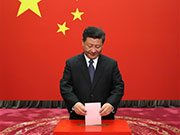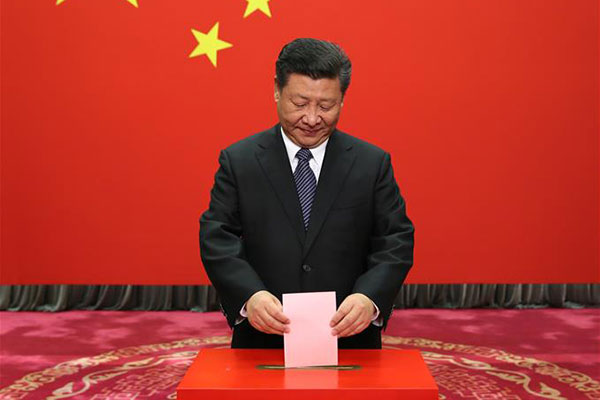Chinese people start to vote for local level lawmakers

 0 Comment(s)
0 Comment(s) Print
Print E-mail CNTV, November 16, 2016
E-mail CNTV, November 16, 2016
Chinese President Xi Jinping cast his ballot at a polling station in Beijing on Tuesday to elect new deputies to the local people's congress.
 |
|
Chinese President Xi Jinping casts his ballot at a voting booth to elect new deputies for the local people's congress in his district in Beijing, capital of China, Nov. 15, 2016. [Xinhua] |
Members of the Standing Committee of the Political Bureau of the Communist Party of China (CPC) Central Committee -- Li Keqiang, Zhang Dejiang, Yu Zhengsheng, Liu Yunshan, Wang Qishan and Zhang Gaoli -- also cast their votes in Beijing.
Jiang Zemin and Hu Jintao voted by proxy.
Xi cast his vote at a polling station in Huairentang, Zhongnanhai electoral district in Xicheng District of Beijing, along with over 1,200 other voters.
Around 10 a.m. Tuesday morning, Xi arrived at the polling station, gave his elector's card to staff and got a ballot. He cast his ballot after filling it.
Xi said the county and township-level election is a major political event of the country, requiring adherence to the Party's leadership, democratic spirit and acting in accordance with laws, to ensure the people's right to vote and the right to be elected.
He called for a zero-tolerance attitude toward electoral misconduct.
It is the second election since the Electoral Law granted equal representation for rural and urban residents.
Since 1995, each rural deputy had represented a population four times that of their urban counterparts.
The elections of local people's congresses have commenced across the country and will continue till next year.
"Elections in China are becoming more open and transparent. Participation is crucial, and the people have shown great enthusiasm," said Liu Wei of Renmin University of China.
Other senior officials and retired officials of the CPC Central Committee, the National People's Congress (NPC) Standing Committee, the State Council, the Supreme People's Court, the Supreme People's Procuratorate, the Chinese People's Political Consultative Conference National Committee and the Central Military Commission, also voted either in person or by proxy.
About 9 million people cast their ballots at a total of 12,270 polling stations in Beijing on Tuesday, to elect 4,373 new deputies to the people's congresses of district level, and 9,946 deputies to township-level people's congresses.
According to the law, candidates must be nominated by political parties, social organizations, or a minimum of 10 voters in their constituency.
Before the final vote, electoral committees will, on voters' request, arrange for candidates to meet with voters to introduce themselves and answer questions.
Major political event
Nationwide, more than 900 million voters are expected to directly elect more than 2.5 million lawmakers in county or township-level elections beginning this year.
Under China's current Electoral Law, deputies to people's congresses at the level of townships and counties, who account for more than 90 percent of lawmakers at all levels nationwide, are elected directly by voters.
They in turn elect deputies to people's congresses of cities who then elect deputies at the provincial level.
NPC deputies are elected by people's congresses of provinces, autonomous regions and municipalities.
It is via the NPC and local people's congresses at different levels that the Chinese people are involved in managing state affairs and exercising state power.
"Our country sets great store by this year's elections, with more strict procedures to vet candidates," an expert on elections and the system of people's congress with Fudan University told Xinhua on condition of anonymity.
"On the path of rule of law, the Party and government are making solid efforts to safeguard people's rights, and more and more people are becoming aware of their own rights," he said.
While noting that the election systems in China and the United States have huge differences and cannot be compared to each other, he highlighted one trait in China's people's congress elections that is absent in its American counterpart -- stipulations that require an "appropriate proportion" of women deputies and those of ethnic minorities and that such ratios should increase steadily.
In fact, the ratio of deputies from many minority groups exceeds the ratio of their population.
For example, among nearly 3,000 NPC deputies elected last time, 20 are from the Tibet Autonomous Region, of whom 12 are from the Tibetan ethnic group, and one each from the Moinba and Lhoba ethnic groups. Deputies from Tibetan and other ethnic minorities account for more than 93 percent of all deputies elected at the levels of region, prefecture, county and village in Tibet.
Women in Tibet have also seen their status raised. Female deputies make up 25.4 percent of the total in the Tibet regional people's congress.
"Every country needs an election system that caters to its own cultural tradition and social environment. There's no definite answer which country has the best election system. Every system has its positive sides and is evolving through practice," Liu added.





